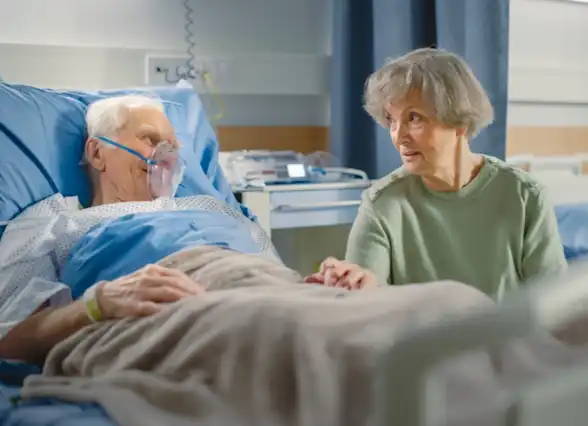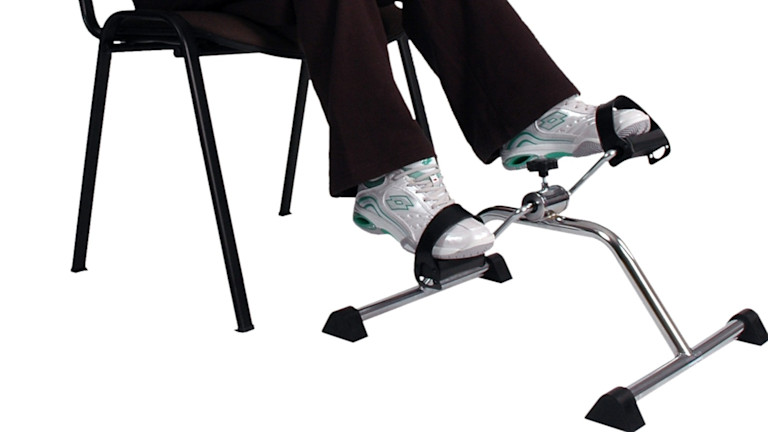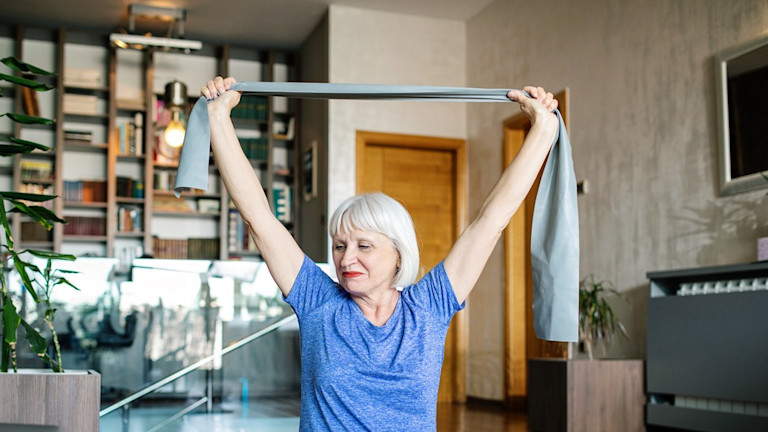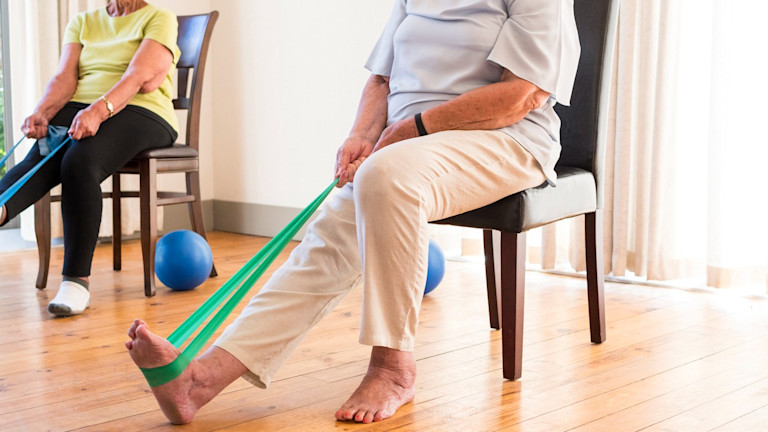Avoiding Hospitalization for COPD
Your loved one has been hospitalized for treatment of a COPD exacerbation. What you need to know about decreasing the need for hospitalization.
Get insurance benefits, legal documents, and medical records in one place

Helpful Highlights
Sometimes hospitalization is necessary to resolve a COPD exacerbation.
Exacerbations are not always preventable and often no one's fault.
As the disease progresses, so do the frequency and severity of exacerbations.
More than a third of patients hospitalized for COPD exacerbation are readmitted to the hospital within 90 days. A good discharge plan and ongoing compliance with prescribed medical treatment can help your loved one avoid readmission. Likewise, early recognition of exacerbation symptoms and prompt intervention are crucial to preventing the exacerbations that send them to the hospital.
How are hospitalizations avoided?
Regularly discuss ongoing COPD maintenance and update the treatment plan with the provider.
Ask the provider what should be done when symptoms worsen - how to use rescue medications and implement additional interventions (such as increasing oxygen), when to call the provider, and when to call 9-1-1
Monitor your loved one and ensure they are adherent to their COPD treatment plan.
Ask the health care team questions if you do not understand the discharge instructions following a hospitalization, or want more specifics.
Be observant of subtle changes in your loved one's breathing, energy level, or activities of daily living
Encourage your loved one to be active - take short walks, tend flowerbeds or garden, or run a simple errand. Staying active increases breathing capacity and reduces the risk of exacerbation.
Exercise
"A WALK a day keeps the doctor away!" Regular physical activity is an important key to managing COPD. Even a short walk daily can make a big difference in symptoms and quality of life.
Exercise lowers heart rate and blood pressure, making the body more efficient at using oxygen. This means the lungs don't have to work so hard. Cardiovascular exercise also helps strengthen chest muscles, which can also ease breathing.
How long or short is a "short walk"? Rather than put a number on it, walk until it is a little hard to breathe and follow these guidelines:
Slowly increase walking distance.
Try not to talk when walking.
Discuss walking distance and location with the primary care provider or pulmonologist.
There are also several alternatives to walking (or additions to walking), such as riding a stationary bike or using a pedal exerciser. Many pedal exercisers can be placed on the floor for foot pedaling AND placed on a tabletop for arm pedaling.

Another alternative to walking is strength-building, which can be accomplished even while sitting.
Stand up and sit down several times.
Lift your legs straight out in front of you by extending the knees, holding them outstretched for a few seconds, then bend the knees and slowly lower them down. Repeat this movement several times.
Use wrist weights, small weights, or an exercise band to strengthen arms and shoulders. Ankle weights and bands can also be used to strengthen legs.


Talk to a primary care provider, pulmonologist, or physical therapist about appropriate cardiovascular and strengthening exercises for your loved one. Also, discuss conditioning programs such as pulmonary rehabilitation.
Healthy, COPD-compatible diet
Have smaller meals and high-protein, high-calorie snacks throughout the day. This may seem counterintuitive, but working to breathe burns a lot of calories. High-calorie, high-protein foods also help a person feel fuller, longer.
Choose food that's easy to chew, and allow for plenty of time to breathe between small bites.
If a large meal is preferred, eat it earlier in the day (breakfast or lunch)
Avoid things that cause bloating, like fizzy drinks and fried or greasy foods
If prescribed oxygen, use it oxygen while eating
Drink at least 8 oz of water after each meal
Clean air
Stop smoking and stay away from smoke
Clean up your air
The most common cause of COPD exacerbation is poor air quality, indoor and out
Start by removing clutter, which attracts dust
Vacuum floors and curtains frequently, preferably with a HEPA filter vacuum
Get your air conditioner inspected for mold and mildew or other build-up
Consider using an air purifier or ionizer
Avoid fumes from cooking and cleaning products (especially aerosols), perfumes, and paint
Stay away from smoke
Avoid pet dander
Medications
Take medicine as prescribed
Know how and when to take COPD medications
Don't be hesitant to use rescue medications, as prescribed
Use oxygen when prescribed
Encourage regular flu and pneumonia vaccinations
What more can you do for your loved one?
In addition to the above, you can do a lot to help your loved one reduce the risk of hospitalization by reducing the potential for exacerbations.
Help your loved one to stay on the prescribed COPD treatment plan.
Assist your loved one to avoid common triggers.
Smoking or being around others actively smoking
Indoor and outdoor air pollution - use an air ionizer, stay inside when outdoor air quality is low
Irritants such as aerosol sprays, as well as fumes from cooking or cleaning products
Keep indoor temperatures cool
Ensure everyone washes their hands frequently
Control household dust
Avoid anyone with active respiratory illness
Ensure your loved one has all the medications they need and knows how to take them as prescribed
Encourage early use of rescue medications (inhalers, nebulizers, anti-anxiety meds)
Encourage your loved one to get regular flu and pneumonia vaccines
Help your loved one to practice breathing exercises, relaxation, and body positioning techniques
Observe for subtle changes in demeanor or physical well-being and ask your loved one questions about what they're experiencing
Encourage your loved one to speak openly with you, their primary care provider, and the pulmonologist
Coordinate and assist with follow-up appointments with providers and therapists
RESOURCES
American College of Chest Physicians (ACCP) – COPD
American Lung Association (ALA) – COPD
American Thoracic Society (ATS) – COPD
COPD.com – Understanding COPD Stages & Progression
Global Allergy & Airways Patient Platform (GAAPP) – Four Stages of COPD
National Institutes of Health (NIH) Heart, Lung & Blood Institute – Lung Health Resources
No content in this app, regardless of date, should ever be used as a substitute for direct medical advice from your doctor or other qualified clinician.
Get more support and guidance on insurance benefits, medical records and legal forms.
Helpful brings together your insurance benefits, legal documents, and medical records in one personalized place — so you always know what you have, and never have to search again.

Technology for Health Tasks. Mental Health for the Tough Stuff.
Helpful connects your medical records, insurance, and caregiving tasks automatically. And when you need more than logistics, a therapist is here to guide you.
In-Network and Covered
For Individuals, Couples and Families
HIPAA Compliant, Data Stays Private


Healthcare Tasks Simplified

From syncing records to spotting drug interactions, Helpful does the heavy lifting, turning complex health info into clear tasks and showing you benefits you can actually use, giving you clarity and control over your care.

In-Network Mental Health

Our licensed therapists are here to support you and your loved ones through stress, burnout, and life’s hardest moments, with an inclusive, compassionate approach that works with most insurance plans.

Create Legal Documents

Plan ahead by creating will, trusts, advance directives and more, that ensure your wishes are honored in the event you can’t speak for yourself -with Helpful guiding you every step of the way.